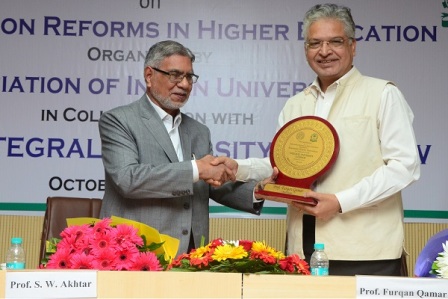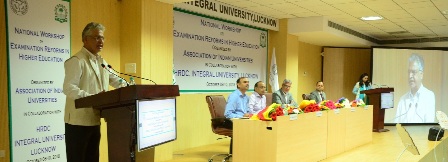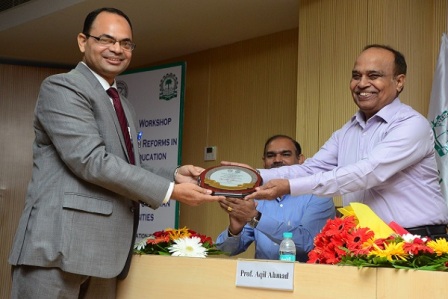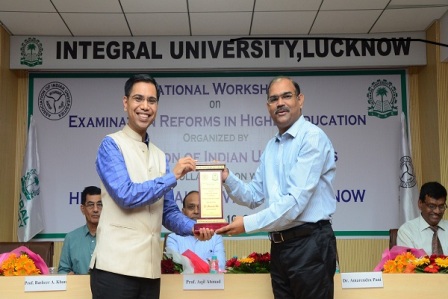Dr. Amrendra Pani, Dy. Director, Research AIU gave a brief introduction about AIU, achievements, events and its establishment in 1925. He said that the basic objective behind the establishment of AIU is to ponder over reforms in a serious manner.
Dr. Pani said that Research is the biggest department of AIU and Youth Festival department has given a platform to many talented young people to excel in their desired field, he quoted the examples of famous celebrities who benefitted from AIU. The imminent educationists like Prof. S. Radhakrishnan and Dr. Zakir Husain have been the president of AIU. Speaking further, Dr. Pani highlighted three major points as the major objective of AIU i.e. .research based policy inputs, derive the policy of higher education and to reflect the skills of various universities. Of late, due to the surge in the number of aspirants of higher education, the role of technology has become quite important.

He highlighted the importance of “cafeteria approach” wherein any individual from any field of study can take a course in any other field of study to pursue his passion, thus the change from a rigid system to a flexible system must be brought in. He also emphasized the need to switch from compartmentalized classroom to smart classrooms. Prof. Aqeel Ahmad, Vice-Chancellor, Integral University Lucknow talked about conducting an examination that has always been a challenging task.

Prof. Furqan Qamar, Secretary general AIU and Chief Guest of the session, admired the University in coming forward to endorse the responsibility of conducting AIU workshop and providing the necessary infrastructure to carry out the event at such a large scale. In his address, Prof. Furqan Qamar said that participants have been attracted in remarkable strength towards Integral University and has just doubled to a voluminous 104 Participants. He appreciated the hard work done by academics and logistics of a higher education system that needs a war-step reform. He invited the participants to actively participate in the workshop and emphasized that we have to “trust the teacher” for assessment, examination, and evaluation. He said, but for that, we have to appoint good teachers as everybody cannot be a teacher. He further added that we have to make the students believe in the experience of the teachers, and the teachers have to value the creativity of the students. He began his talk by highlighting how examinations have evolved over a period of time. From No examinations in Gurukuls and Madarsas to the present concept of rigorous examination, clearly, the focus has totally shifted from imparting knowledge to just examining not worrying whether the student is learning or not. Prof. Qamar recommended the concept of giving autonomy to teachers itself in conducting the examinations as opposed to the idea of having a well-defined controller of examination office; developed countries are already doing this. In logistics, there are so many issues in having crept in as the litigations have become more common, delay in academic sessions, errors in the evaluation of answer scripts, the risk of question paper leaking to name a few. Following academics concept will require the appointment of good quality qualified teachers who can create creativity in students which could only come when young minds of the students combine with the experience and knowledge of the teacher. He encouraged the delegates to share their experiences among themselves and try to frame solutions to the present problems being faced by the examination system. He concluded by defining the quality mandate of UGC i.e shifting from the present system of learning to the outcome-based learning.


Prof.S. W. Akhtar, Hon'ble Chancellor suggested that the first page of copies should have OMR sheets format which in result create some ease in a smooth evaluation. He said that it is a costly affair and a time-consuming matter. He hoped that the workshop will certainly propose the solutions to the problems. He suggested that the manual feeding of marks into the system and manual coding of answer scripts are time taking and they eventually produce delay in result declaration, instead a title page of the answer scripts should be given in the form of an OMR sheet which can go through scanner via some already developed computer program for the purpose, it would definitely speed up the process of evaluation and result declaration. Various Technical Sessions were held during the National workshop to explore and gauge the contemporary assessment techniques and suggesting reforms to the existing Examination system.
October 8, 2018, Technical Session I: The first session of the workshop was held by Prof. Basheer A. Khan, advisor to the Hon’able on “Feasibility of on Demand Examination System: National and International cases”, he started his technical talk by quoting Rudyard Kipling’s practice keeping 6 wise men which included “Why, When, How, Who Which Where” which he related to examination practices. Citing his experience as Vice Chancellor, he profoundly talked about the drawbacks in current examination systems. He appreciated that ancient Indian education system did not have an examination as we see it now rather Gurukuls and Madarsas had a simple concept of education i.e. “Listen and Keep in your mind”. The current system of Indian examination system was adopted by the British during their rule which they had adopted from Chinese system of examination which traces back to 905 A.D.
Prof. Basheer cited Indian achievements in other fields like ISRO’s Mars mission and their launch of satellites for NASA and raised the question that why should India adopt Macaulay’s examination system when we have the potential of doing far better. He said with emphasis that regions are of different types, therefore, there should be different ways of assessment modes. As examinations cannot be segregated from education there is a need to overhaul it so as to make them tools of assessment rather than customary means to provide just a degree. It should be a transparent and efficient system. He discussed the concept of On Demand examination by citing a few examples from India as well as abroad. He even suggested the idea of getting away with examination and adopts continuous assessment which relates education with evaluation. Such a system inculcates traits which are readily accredited by society.

Citing an example of a musician and Dance teacher, he pointed out the holistic approach of examination rather than using just written form. By following this approach the worth of a learner for the objective of learning can be established. The degree of insight acquired should be gauged along with the skill and personality. Challenging the de-facto system of examination, he raised a question whether or not examinations are needed at all? Supporting his claim, he cited the system followed by Sri Aurobindo School of International Education, Pondicherrry and Leeds University, U.K. where there are no examinations other than entrance examination. Thus the filter system should be made more efficient instead of spending precious resources on conducting examinations. He recommended that the practice of having external examiner should be discontinued. He also flaunted with the idea of handing over the examination to external agencies which have expertise in conducting examinations and do it on demand basis. He cited the international tests such as GRE/GMAT and UPSC’s recent initiative of allowing candidates to withdraw from the examination after registering themselves. He raised the question of whether such practices can be adopted formally at a large scale. He further said that sometimes there is a need for taking a risk in a quest of changing the examination system. “Instead of making examination a source of stress for students, often leading them to take extreme steps, why not make learning enjoyable which can create passion in students”, he remarked.
October 8, 2018, Technical Session II: The second session of the workshop was held by Prof. Rajeev Pandey Data Scientist, Lucknow University on “Examination Reforms –A Bloom’s Model, Choosing Right Techniques” Prof. Rajeev Pandey Quoting the phrase “India has examination system, not education”, he emphasized that the examination system of India has turned out to be obsolete and is stress burdened. The examination is merely a deciding factor to evaluate the ability of a student and there is no place for the performance of a student in a full academic session. Prof. Rajeev Pandey illustrated the concept of evaluation in an educational context which implies a broader program than the examination in which achieving aptitudes, interests, personality traits, and skill factors take into consideration. The evaluation produces the data for cognitive, affective and psychomotor objectives being both qualitative as well as quantitative. Pondering upon the key challenges in the examinations system in South East Asian Universities, Prof. Pandey enumerated various issues such as Administrative challenges; infrastructure challenges; resources allocation; security challenges etc. He also advocated the philosophy of “Powerful Tactics to Lead without a Title” by Robin Sharma, the world's premier speaker on Leadership and Personal Mastery. He recommended that various designations in any educational institution/university create unnecessary confusions and there should be only one designation i.e. ‘TEACHER’. Prof. Rajeev Pandey recommended that the main aim of education should be overall development of the students. He insisted on implementing BLOOM’s model which attempts to divide learning into the three main domains of student’s personality i.e. cognitive, affective and psychomotor domain. To evaluate these three different domains the examination system should be designed in such a manner so that we could analyze the human personality, interest, aptitude, intelligence, and emotions of the students. Conscious efforts to map the curriculum and assessment to these levels can help the programs to aim for higher-level abilities which go beyond remembering or understanding. It is also recommended that an institution/University level, upper limit need to have arrived for lower order skills (for example, no more than 40% weight for knowledge-oriented questions). Considering the fact that, as nature of every course is different, the weight for different cognitive levels in the question papers can also vary from course to course. Further, higher-order cognitive abilities like critical thinking, problem-solving and making informed decisions are also crucial for a graduate to succeed in the emerging world. Prof. Rajeev Pandey emphasized using Scoring Rubrics as an assessment tool to measure a student’s performance and learning across a set of criteria and objectives. He concluded his interesting and interactive session with the last recommendation to conduct “Open Book Examinations”, which will discourage rote learning and more superficial application of knowledge.
The “Experience Sharing” session was moderated by Prof. Abdur Rahman Khan in the evening. After initiating the session the floor was thrown open for open discussion. A participant said that at their places, the copies are evaluated digitally. The script is scanned and each page has bar-code. This practice has resulted in a significant reduction in evaluation time and zero totaling error having 100 thousand scripts, within 25 days which otherwise would take 3 months. Pune University, following a similar system, added three- layer impregnable security system thus completely routing the chances of question paper leakage of any sort. They have boosted the system by providing affiliated colleges with financial aid under the QIP program. They have developed software which can even track any particular affiliated college in case of doubt of question paper leak from that college. They further added that they maintain a Question Bank provided by teachers and the papers were auto-generated by the system. GLA University Mathura also follows the question bank system by maintaining a pool of questions. GNA University Punjab conducting a pilot study by adopting a novel method of scanning and evaluating the answer scripts and found it to be a great success. The success is attributed to the efficiency of ICT service provider, thus again highlighting e role of ICT in the ease of evaluation process. Maharashtra Animal and Fishery Sciences University brought out a very transparent feature that Vice Chancellor and Controller of Examinations can monitor the entire examination process from their respective offices. It was also discussed that Karnataka University had stopped digital evaluation after the initial implementation of the system. Discussion followed and it was agreed that question uploading was decently mastered by various universities but digital evaluation of scripts was still in its infancy stage and needs much more comprehensive analysis related to cost. Since the high cost of digital evaluation is a major concern due to which it could not be implemented at the mass level and confined only to specific courses/cases. At the University of Calicut, the student related tasks such as admission, verification; hall ticket printing etc. are done through the online system. As far as the online evaluation is concerned they faced the problem of minimizing the cost. They charge Rs 33 per copy per exam but the real cost for online evaluation was around Rs 50.
Hindustan Institute of Technology and Science, Chennai conducts paperless examination by adopting an eco-friendly method. All the students are provided I-pads for answering questions, using this method not only multiple choice but descriptive questions can also be answered with much ease. They claim to have observed a huge reduction in cost by deploying paperless methodology of conducting examinations. Manipur University (Jaipur) uses digital method for evaluation of scripts; they use this method for nine thousand students and aim to increase it to eighteen thousand. They also conduct open book exams using digital pads or tablets where questions are uploaded and answers are recorded.
October 9, 2018, Technical Session III: Dr. Syed Nadeem Akhtar, Dean (Engg.) and Director Planning and Research, Integral University, Lucknow held the third session on “Choice Based Evaluation System and Credit Transfer”. He shared his ideas on existing evaluation systems and emphasized the difficulties in administrating the examinations even among the most flexible examination systems. He mentioned that UGC has made CBCS mandatory for all universities in 2016 but still it is not being implemented in its true spirit by Indian universities.
He said that a credit-based choice system is a systematic way of describing an educational programme by attaching credits to its components. The definition of credits in higher education system may be based on different parameters, such as student workload, learning outcomes, and it’s things. Credit system makes study programmes easy to read and compare for all students, local and foreign, facilitates mobility and academic recognition. He also inferred that the allocation of credits is normally based on the duration of a programme. Credits are allocated to all educational components of a study programme such as modules, courses, placements, dissertation work, etc. and reflect the quantity of work. Each component requires in relation to the total quantity of work necessary to complete a full year of study in the programme considered.
He further elaborated that CBCS has a symbiotic relationship among teacher, student, and universities. The credit system allows students to study what they prefer in their own sequence as per their interests. “Students can learn at their own pace and can opt for additional courses achieving more than the required credits. It provides freedom for an interdisciplinary approach to learning with inter-college/university migration within the country and outside becomes easy with the transfer of Credits. The students have more scope to enhance their skills and more scope of taking up projects and assignments, vocational training, including entrepreneurship. The system improves the job opportunities of the students. The system will help in enabling potential employers to assess the performance of students on a scientific scale” he added.
Dr. Nadeem enunciated that the main challenge in CBCS system is to estimate the Credit and the exact marks. Credit allocation varies among different universities and was brought about by comparing UGC system with ECTS (European Credit Transfer and Accumulation System), guidelines Technology, Kanpur (IITK) and guidelines followed by Indian Institute of Information Technology, Hyderabad.
Dr. Akhtar in his interactive session recommended that to implement CBCS system in its true spirit, a well equipped IT infrastructure is needed along with proper awareness among teachers is also requires Relative Grading system can also be used to grade the student which may be based on comparative performance of the students rather than being absolute grading. He advocated the use of uniform CBCS system and ended his lecture with the emphasis on the evolution of CBCS system. He recommended that there should be at least three-day workshop on CBCS system awareness so that academicians could understand that system well in terms of running the courses effectively and smoothly.

Prof. Javaid Akhter, former Registrar, Controller of Examinations AMU Aligarh interacted on the issues of examination; he elaborated the structure of admission and examination at Aligarh Muslim University. He explained the participants about the admission quota of AMU which is based on internal and external standard Central government quota stratification and not on a religious basis. Further, he stressed the importance of teacher’s role in conducting speedy and secure examination. He illustrated the relationship between the accuracy and confidentiality of question paper. In his views, one has to compromise with accuracy to maintain confidentiality while conducting the examination.
At the Valedictory session of the workshop held on 10th October , Dr. Syed Aqeel Ahmad, Director, HRDC, Integral pronounced the workshop, a breeding ground of optimism and reforms that would surely make the Indian education system qualitative and efficient.